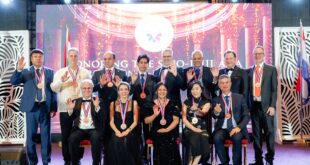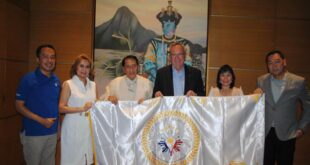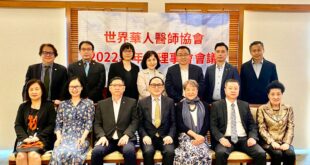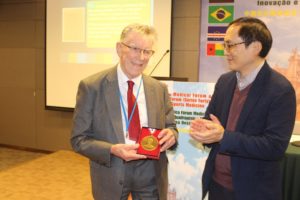
The 40th session of the Sino Luso International Medical Forum has awarded Dr. Ronald Harden, OBE, with the Dr. Henry Fok Memorial Lecture Medal.
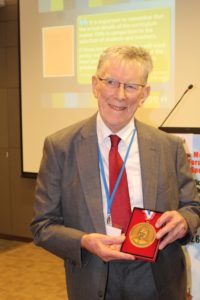
Dr. Harden is a pioneer of the Objective Structured Clinical Examination (OSCE) and professor emeritus of Medical Education at University of Dundee and General Secretary for Association of Medical Education in Europe (AMEE).
Following his awarding last week in Manila with the Gusi Peace Prize International and lecture at the 3rd Sino-Asia Pacific Medical Forum, Dr. Harden arrived in Macao and toured the Faculty of Health Sciences and University Hospital on the grounds of the Macau University of Science and Technology. He then delivered a lecture on the importance of the teacher in medical education to Macao’s frontline healthcare providers and educators.
Professor Manson Fok, a son of the late Dr. Henry Fok and Dean of the Faculty of Health Sciences at MUST, explained why Dr. Harden was chosen for this prestigious, Olympic sized medal.
Prof. Fok explained, “Professor Harden is a world-renowned educator. He has built many curricula and seen the changes in medical education throughout the years. He is a jewel for us. In Macao, when we have our medical school, not only for undergraduate but for post-graduate doctors, and for nurses training as well, his work will help us.”
Prof. Fok, who is also the President of the Sino-Luso International Medical Forum, said, “My only suggestion is for those higher officials making decisions asking whether Macao needs a medical school should listen to these experts as to the reason why it is good for the community and population, and good for Macao as whole. We should embark on this journey.”
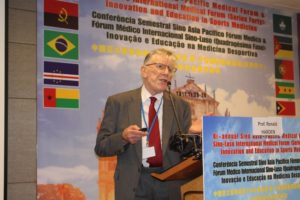
Dr. Harden told the Peace Post, “Medical education has been very much a neglected specialty. People thought at first that I when I moved from endocrinology to medical education that I was rather crazy.”
Dr. Harden said, “Now, its been recognized that medical education is just as important if not more important than any other specialty. That its being recognized in this way [with the Dr. Fok] medal just gives me so much thrill, and makes me know I’ve made the right choice at the right time in medical education rather than simply advance my own specialty.”
He continued, “We touched on our excellence in education award. This was set up because too much was being emphasized on research in education and not enough in teaching. So this award was set up to recognize schools that were not just excellent because of their research, because they were excellent in delivering in matters of teaching programs for the students.
“We set that up in 2012 recognizing that there are excellent schools around the world for specific areas in teaching. We originally identified areas including student engagement with the curriculum and social accountability of medical school assessment. We added recently simulation training and faculty development, and this year curriculum planning.
“This recognizes them internationally judged by a panel and by a world board of directors. And these schools have achieved excellence in these teaching areas. That already is showing that students are interested to come enroll in these schools rather than enroll in a school that is just prestigious for its research.”
During his lecture noted that he had made a cheeky formula to present to some German Vice Chancellors regarding medical education.
Dr. Harden said of the outcome, “They took it very well and they asked the question: ell how many of these technical competencies does the teacher need to be excellent in? Which is interesting. I’ve asked that question of different audiences and you get different answers. Some people are very optimistic and say these should be assessed in all areas, and others are more realistic and say selective, but be excellent in them. That’s why I put plus symbols in there, and on other ones I put multiplication symbols. Meaning that if you not excellent in terms of your attitude you get nothing. Then your not an excellent teacher at all. So you need to be excellent in how you approach the teaching, and be excellent in how you keeping yourself up to date.”
Asked how he felt seeing the Center of Medical Professional Excellence at the Faculty of Health Sciences at MUST and what he thought about the future of simulation training, Dr. Harden said, “It’s a key component. I think its one of the most n talked about topics in the future of medical education in schools. One thing is to have more authentic curriculum in schools. In other words, curriculum that trains students for the practice of medicine. Because that is how a school should be judged in terms of its product. To have an authentic curriculum I think one needs to base their training in the real world. Of course, the basic sciences are important but you also must learn simulation. You cannot only apply the basic sciences of medicine, you can acquire the critical skills early on without damaging patients.”
From his observations, could Macao sustain a medical school today? Dr. Harden said without hesitation, “Oh absolutely. We did visit the simulation center yesterday [at the Faculty of Health Sciences at MUST] and I think that’s a great resource and the hospital. Often you see schools they set up without these facilities and then they struggle for years trying to create what we see here with clinical facilities for the students. Here, its already waiting for the students. So I think here you could start very early on.”
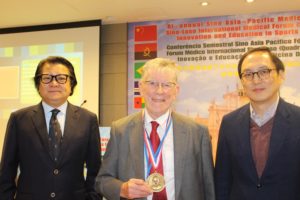
He continued, “I hope that students would start learning like this early on. Because in the past you spend the first two years busy learning the medical sciences and then move on if you pass the written exams, then you advance. That no longer is sustainable.”
Dr. Harden added, “We need authentic curriculum where students are exposed to clinical medicine. I think you could do that here.”
 Peace Post Asia Healthier News For The World
Peace Post Asia Healthier News For The World
